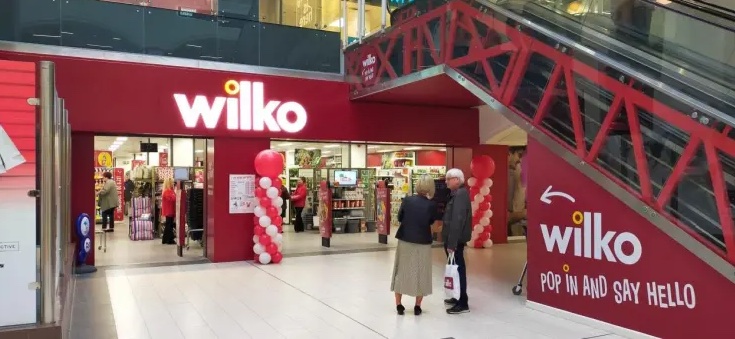Mark Kleinman: The inquest into Wilko’s demise has only just begun

Mark Kleinman is City editor at Sky News
Inquest into Wilko’s demise has only just begun
Few things elicit British consumers’ sentimentality like the imminent disappearance of a once-proud high street name. For Woolworths in 2009 and BHS in 2016, read Wilko in 2023.
The sad fate of more than 10,000 employees at the family-owned chain deserves sympathy, and warrants more than the superficial support of rivals taking on its stores.
There are sound reasons, though, why retailers like Wilko cease to exist. The inability to compete with larger rivals on price and range while facing the twin pressures of inflation and deteriorating consumer sentiment left it cut adrift.
And its owner’s unwillingness to face the brutal reality of its impending financial trouble provides another salutary reminder of the importance of robust corporate governance, even – or especially – in privately held companies with substantial workforces.
Administrators will now have the task of assessing its directors’ conduct in the period before its collapse. I suspect their reluctance to recognise the pace at which the retail sands were shifting beneath the company will merely end up highlighting naive incompetence.
However, those left jobless deserve for the payments of tens of millions of pounds in salaries and dividends to the chain’s family directors and shareholders in the years before it ran into trouble to face proper scrutiny. Those awards certainly give the lie to the notion that private companies are better equipped to take decisions in their long-term interests.
The alacrity with which some have rushed to criticise Hilco, the specialist distressed retail investor, has a faint air of scapegoat-hunting desperation. It was Hilco which stepped in with £40m of secured debt at the beginning of the year, as the possibility of a company voluntary arrangement loomed. This was the definition of risk capital, which by its nature must come with the potential for outsized, and preferred, returns. The series of covenant waivers and provision of additional funding granted by Hilco during the insolvency also suggest a more nuanced narrative than the vulture fund label it struggles to shake off.
The cold reality is that had it not stepped in, Wilko would not have had time to consider restructuring options and the chain’s demise would likely have occurred sooner.
PricewaterhouseCoopers was close to clinching a sale of the bulk of Wilko to Doug Putman, the owner of HMV, until Gordon Brothers, which was lined up to finance him, pulled the plug. The Pension Protection Fund, a major Wilko creditor, is now said to be keen for an independent liquidator to be appointed to sift through the wreckage. With the government having backtracked on proposals this week to create a single standalone insolvency regulator, the PPF should follow its instincts.
Gray could be the latest to don two hats in the FTSE boardroom
Woman overboard? The latest instalment of the FTSE-100 chair merry-go-round is, I’m told, close to being confirmed. Danuta Gray, who has just raided Aviva to find a new chief executive at Direct Line Group, which she chairs, is said to be on the brink of being named chair of Croda International, the chemicals group.
Gray, who is also a non-executive director of Burberry, will continue the growing trend for individuals holding more than one listed company chairmanship. In her case, her new appointment will bring the welcome benefit of maintaining the number of women occupying FTSE 100 chair roles (the incumbent at Croda is Anita Frew, who is also a dual chair at the helm of Rolls Royce Holdings).
Might it also say something, though, about the depth of the talent pool from which headhunters are selecting? My rudimentary analysis suggests that 62 FTSE 350 chairman-ships are held by individuals doubling-up – a significant if not overwhelming number. If the economy worsens, I’d expect that number to increase as boards opt for the safety of experience.
Bink in the pink but it’s not long out of the red
Barclays Bink? Not any more, it seems. Word reaches me of further intrigue at Loyalty Angels, the fintech which trades under the Bink brand and has partnerships with a slate of lenders and high street retailers.
A recent shareholder update from Mike Jordan, its chief executive, revealed that its long-standing commercial ties to Barclays are in the process of being severed.
“At this point in time we do not see the prioritisation and promotion of the Bink capability within the Barclays app to be at levels required to ensure value to our retail partners and resultant revenues to us,” he wrote.
Bold stuff, particularly because as recently as late last year Bink was engaged in a fight for survival – one it survived only by the skin of its teeth. At that point, when Bob Wigley, the chairman of banking industry trade body UK Finance, stepped down as chair of Loyalty Angels, things looked pretty hairy. Now, though, Jordan claims it is on the front foot, having signed a deal with “the leading bank in an international territory”.
Additionally, it has struck partnerships with Costa Coffee and The Works, the books and toys retailer, to add to its list of payment-linked loyalty affiliates; others, with Iceland and Wasabi, will be discontinued.
Its primary UK banking relationship will be with its other strategic investor, Lloyds Banking Group. As so many tech company failures have demonstrated in recent months, the presence of a big industry player on its share register can be invaluable at times of distress – but neither is it a guarantee of bottomless pockets. I suspect it won’t be too long before the Bink begging bowl comes out again.
